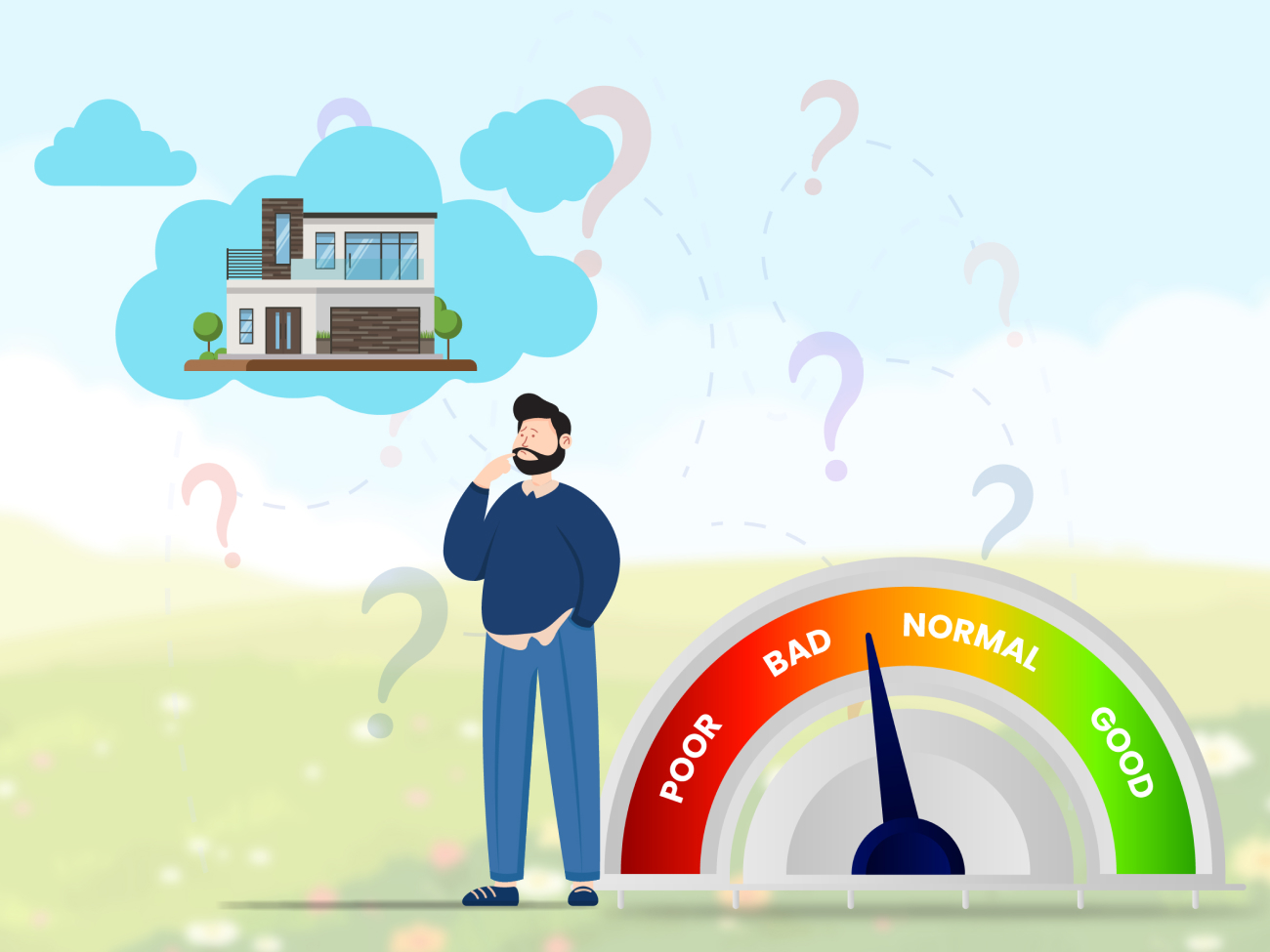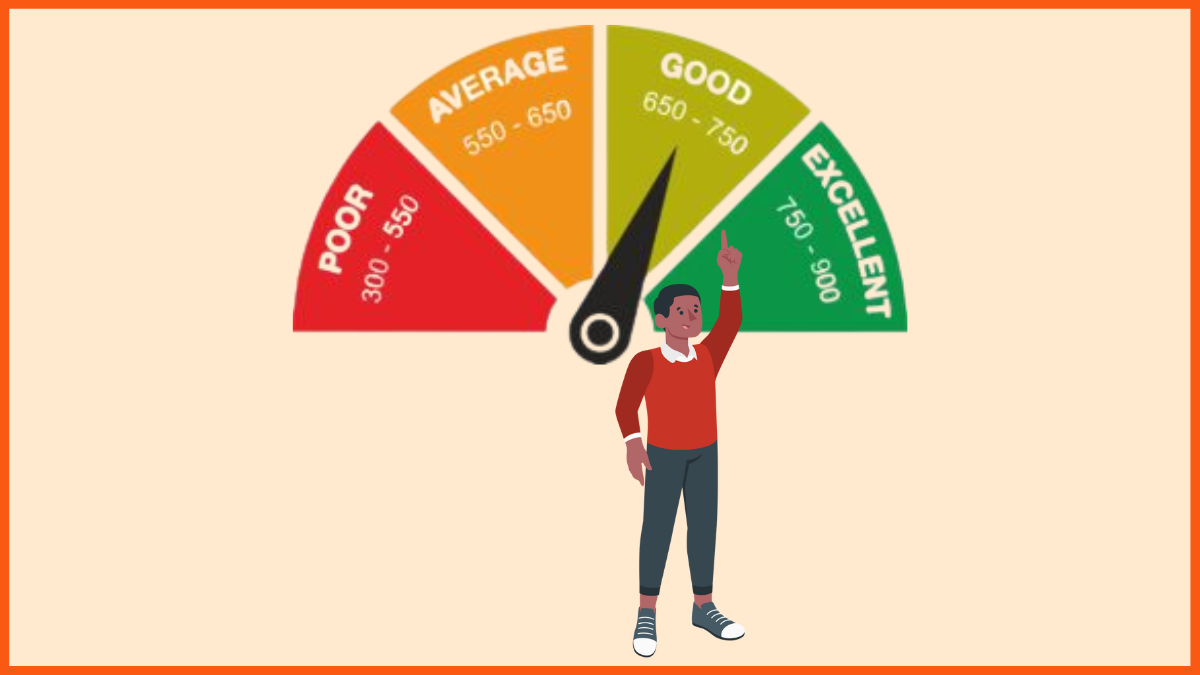Many people share the dream of owning a home, but individuals with a low CIBIL score may need help to achieve this dream. Securing a home loan can be challenging with a low credit or CIBIL score, but it’s manageable. Individuals with low CIBIL scores can still achieve homeownership by seeking guidance and knowledge to explore alternative options and find lenders who cater to their needs.
Securing a Home Loan with a Low CIBIL Score: A Step-by-Step Guide
Here’s a step-by-step guide on how to get a home loan with a low CIBIL score:
Check Your CIBIL Report
Obtain Your CIBIL Report with Ease in Just 7 Simple Steps
1. Visit the CIBIL website and select “Get Your CIBIL Score” or “Check CIBIL Score”.
2. Create an account or access your existing one using your login information.
3. Provide your personal information, such as your name, date of birth, address, PAN card number, and identity proof.
4. Verify your identity by entering the One-Time Password (OTP) sent to your registered mobile number or email address.
5. Please make a payment of ₹550 (if necessary) to access your report.
6. Carefully review your CIBIL report, paying close attention to:
– Your credit score is a three-digit number that ranges from 300 to 900.
– Credit history – Loan and credit card accounts
– History of payments – Utilization of credit
– Mistakes or inaccuracies
7. Make sure to address any errors or inaccuracies with CIBIL to ensure the accuracy of your report.
Regularly monitoring your CIBIL report empowers you. It keeps you informed about your credit health and enables you to make well-informed financial decisions.
Improve Your Credit Score
Regardless of your current financial situation, enhancing your credit score can be instrumental in reaching your objectives. These steps can assist you in improving your credit score:
Verify your credit report: Get a hold of it and carefully examine it for any mistakes or inaccuracies.
Ensure timely bill payments: The punctuality of your payments plays a significant role in determining your credit score, as it accounts for 35% of it.
Minimise debt: Excessive debt can have a detrimental effect on your credit score. Focus on reducing your debt and keep your credit utilisation below 30%.
Limit the number of new accounts: It’s best to avoid opening multiple credit cards or loans within a short timeframe, as this can harm your credit score.
Build a long credit history: A substantial credit history can positively influence your credit score.
Diversify your credit: Having various credit types, such as credit cards, loans, and mortgages, can positively impact your credit score.
Monitor your credit utilisation ratio: It’s essential to monitor your credit utilisation ratio. Keep it below 30% for all of your credit accounts.
Avoid negative marks: Late payments, collections, and bankruptcies can significantly lower your score.
You can gradually enhance your credit score by following these steps and consistently practising good credit habits.
Choose the Right Lender
It is essential to carefully select a lender when seeking a home loan, particularly if you have a low CIBIL score. Here are a few suggestions to assist you in choosing the appropriate lender:
Conduct thorough research and make comparisons: Take the time to conduct detailed research and compare various lenders, such as banks, NBFCs, and HFCs.
Verify eligibility criteria: Review each lender’s eligibility criteria and confirm that you meet their requirements.
Interest rates and fees: Compare the interest rates and fees different lenders charge to make an informed decision.
Credit score requirements: Review the credit score requirements for each lender.
Loan tenure and amount: Consider each lender’s loan tenure and amount.
Repayment options: Look at the repayment options and flexibility each lender provides.
Customer support: Assess each lender’s quality of customer support and service.
Reputation and credibility: Assess the reputation and credibility of each lender.
Here are some popular lenders that offer home loans to individuals with low CIBIL scores:
– HDFC
– ICICI
– Axis Bank
– SBI
– Kotak Mahindra
– LIC Housing Finance
– DHFL
It is essential to thoroughly assess your options and select the most suitable lender for your needs and financial situation.
Consider a Co-Applicant
Considering a co-applicant can significantly enhance the strength of your home loan application, particularly if you have a low CIBIL score. Let’s explore the advantages of having a co-applicant:
Enhanced creditworthiness: Having a co-applicant with a strong credit score can boost your overall creditworthiness.
Enhanced eligibility: Having a co-applicant can boost your eligibility for a home loan.
Increased loan amount: Having a co-applicant can make you eligible for a higher loan amount.
Improved interest rates: Having a co-applicant can assist you in negotiating more favourable interest rates.
Co-applicants are responsible for repaying the loan together.
Who is eligible to be a co-applicant?
1. Spouse
2. Parents
3. Brothers and Sisters
4. Young adults (above 18 years)
5. Collaborative associates
When selecting a co-applicant, it is essential to consider:
Credit score: Consider selecting a co-applicant with a strong credit score.
Income: Choose a co-applicant with a reliable income source.
Employment history: Consider choosing a co-applicant with a consistent and reliable work background.
Age: Ensure the co-applicant falls within the age range the lender considers acceptable.
Before submitting your application, it is essential to have a thorough discussion and reach a mutual understanding with your co-applicant regarding the loan terms and conditions.
Provide Collateral
Offering collateral can significantly enhance your chances of securing a home loan, particularly if you have a low CIBIL score. Let’s explore the advantages of providing collateral:
Enhanced loan eligibility: Collateral can improve your eligibility for a home loan.
Higher loan amount: Collateral can assist in securing a more significant loan amount.
Improved interest rates: Collateral can assist in negotiating more favourable interest rates.
Reduced risk: The presence of collateral decreases the lender’s risk, increasing the likelihood of loan approval.
What are some possible options for collateral?
Gold or other precious metals
Fixed deposits
Life insurance policies
Additional assets such as shares, bonds, and mutual funds
Here are some factors to consider when providing collateral:
Value: Make sure the value of the collateral is enough to cover the loan amount.
Liquidity: Opt for collateral readily converted into cash if necessary.
Risk: Consider the potential consequences of defaulting on the loan, including possibly losing the collateral.
Here are some popular collateral options for home loans:
Gold loan: Utilize the value of your gold to secure a home loan.
Fixed deposit: Utilize a fixed deposit as collateral to secure a home loan.
Life insurance policy: Utilize a life insurance policy as collateral to secure a home loan.
Before submitting your application, it is essential to thoroughly discuss and reach an agreement with your lender regarding the terms and conditions of the collateral.
Opt for a Longer Loan Tenure
A longer loan tenure can be viable if you have a low CIBIL score. Allow me to explain:
Lower EMIs: With a longer loan tenure, you can enjoy the benefit of reduced Equated Monthly Installments (EMIs), making it more convenient to handle your repayments.
Enhanced eligibility: A longer loan tenure can boost your eligibility for a home loan, as the lender perceives it as a lower-risk option.
Enhanced affordability: Decreased EMIs can make the loan more budget-friendly, alleviating the burden on your financial situation.
However, it is essential to remember:
Longer loan tenure results in a higher interest payout, as you’ll pay more interest throughout the loan duration.
Extended debt commitment: You will have to repay the loan for a longer duration.
If you want to maximise the benefits of a longer loan tenure:
1. Select a lender that provides a range of tenure options to suit your needs.
2. Consider a tenure that matches your retirement age or provides income stability.
3. Review and adjust your loan tenure as your financial situation improves.
Here are some popular loan tenure options:
15-20 years: A popular duration for home loans, providing a good balance between monthly instalments and interest payments.
20-25 years: A lengthier duration, perfect for individuals seeking reduced monthly instalments and are at ease with a more extended financial obligation.
25-30 years: This loan is ideal for individuals who value affordable monthly payments and are comfortable paying a higher interest throughout the loan’s duration.
It is essential to thoroughly assess your financial situation and goals before deciding on a loan tenure.
Be Prepared for Higher Interest Rates
A low CIBIL score could label you a higher-risk borrower, leading lenders to impose higher interest rates to offset the elevated risk. Be ready:
Prepare for higher rates: You might receive higher interest rates than individuals with good credit scores.
Compare rates: Take the time to shop around and compare rates from various lenders to find the option that best suits you.
Consider negotiating: If feasible, discuss it with the lender to see if you can obtain a more favourable rate.
Consider a longer tenure: Consider considering a longer tenure for your loan. By spreading the loan over a more extended period, you can lessen the impact of higher interest rates.
Enhance your credit score: Improve your credit score to become eligible for more favourable interest rates.
It’s important to remember that higher interest rates can raise the overall cost of the loan. Consider this when budgeting and planning your finances.
Here are some helpful suggestions to reduce the effects of rising interest rates:
1. Consider making a larger down payment to decrease the total loan amount.
2. Consider opting for a shorter tenure to reduce the interest you’ll pay throughout the loan.
3. Consider a fixed-rate loan to secure the interest rate and prevent any possible future increases.
4. Seek out lenders who provide interest rate concessions or promotional offers.
Proper preparation and thorough exploration allow you to secure a home loan that suits your needs, even if your CIBIL score is low.
Seek Professional Guidance
Getting professional guidance can be helpful when it comes to navigating the home loan process, especially if you have a low CIBIL score. Here is a list of professionals who can assist:
Financial Advisors: They have the expertise to assist you in enhancing your credit score and developing a tailored financial plan.
Mortgage Brokers: They can connect you with lenders specialising in providing home loans to individuals with low CIBIL scores. Additionally, they can help you compare interest rates from different lenders.
Credit Counselors: Credit Counselors can help you better understand your credit report and score and guide you in improving them.
Loan Officers: Loan Officers are experts in the loan application process and can assist you in finding the most suitable loan options.
The advantages of seeking professional guidance:
Extensive expertise: Professionals possess a wealth of knowledge about the home loan market, enabling them to assist you in making well-informed decisions.
Customised guidance: They can offer advice tailored to your unique financial circumstances and goals.
Access to multiple lenders: Accessing multiple lenders is beneficial as professionals often have connections with various lenders, which can increase your chances of getting approved.
Efficient: They can assist you in navigating the intricate loan process, saving you valuable time and effort.
When seeking professional guidance, it’s essential to keep a few things in mind:
Conduct thorough research and create a list of reliable professionals.
Verify their credentials and assess their experience.
Inquire about their fees and services by asking questions and seeking clarification.
Collaborate to discover the ideal home loan solution for your requirements.
What is a CIBIL or Credit Score?
The CIBIL score is a numerical representation that evaluates an individual’s creditworthiness based on their credit history and repayment behaviour. Credit scores can range from 300 to 900, with higher scores reflecting a more robust credit profile. TransUnion CIBIL, India’s leading credit information company, calculates CIBIL scores. Data is collected from various financial institutions and credit providers. Lenders are given a thorough understanding of an individual’s creditworthiness through the score. The score considers multiple factors, including payment history, credit utilisation, credit age, and credit mix. A solid CIBIL score greatly enhances an individual’s likelihood of being eligible for loans and credit cards at favourable interest rates. On the other hand, a low score can limit their access to credit. A healthy CIBIL score is essential for managing finances and achieving long-term goals.
Understanding How CIBIL Scores Are Calculated
Calculating a CIBIL score involves analysing an individual’s credit history and repayment behaviour, considering information from different financial institutions and credit providers. The scoring process analyses various factors, including payment history, credit utilisation, credit age, and credit mix. The data is processed through a sophisticated algorithm that produces a score between 300 and 900. Higher scores indicate a positive credit history and responsible repayment behaviour, while lower scores suggest a higher credit risk. Lenders utilise the CIBIL score to assess an individual’s creditworthiness and ascertain their eligibility for loans and credit cards, along with the applicable interest rates and terms they qualify for.
How Low is a “Low CIBIL Score”?
In India, a CIBIL score below 650 is considered “low”. Here’s a basic overview of CIBIL score ranges and how they reflect your credit health:
– 750-900: Exceptional credit health – 700-749: Fair credit health – 650-699: Credit health in the range of 600-649: Below average credit score – 550-599: Poor credit health – 500-549: Poor credit health – 300-499: Poor credit health
A CIBIL score below 650 may be considered low, which could pose difficulties when seeking loans or credit cards. It’s essential to keep in mind that lenders have varying criteria for assessing CIBIL scores, and a score of 600 or below may be considered low by some.
Conclusion
Securing a home loan with a low CIBIL scorex requires patience, persistence, and the proper support, as previously mentioned. By understanding your credit report, considering alternative lenders, and seeking professional advice, you can overcome credit obstacles and turn your dream of homeownership into a reality. Remember that a low credit score should help your dream of becoming a homeowner. With the right approach, finding a home loan that suits your needs and budget can make your dream a reality.




